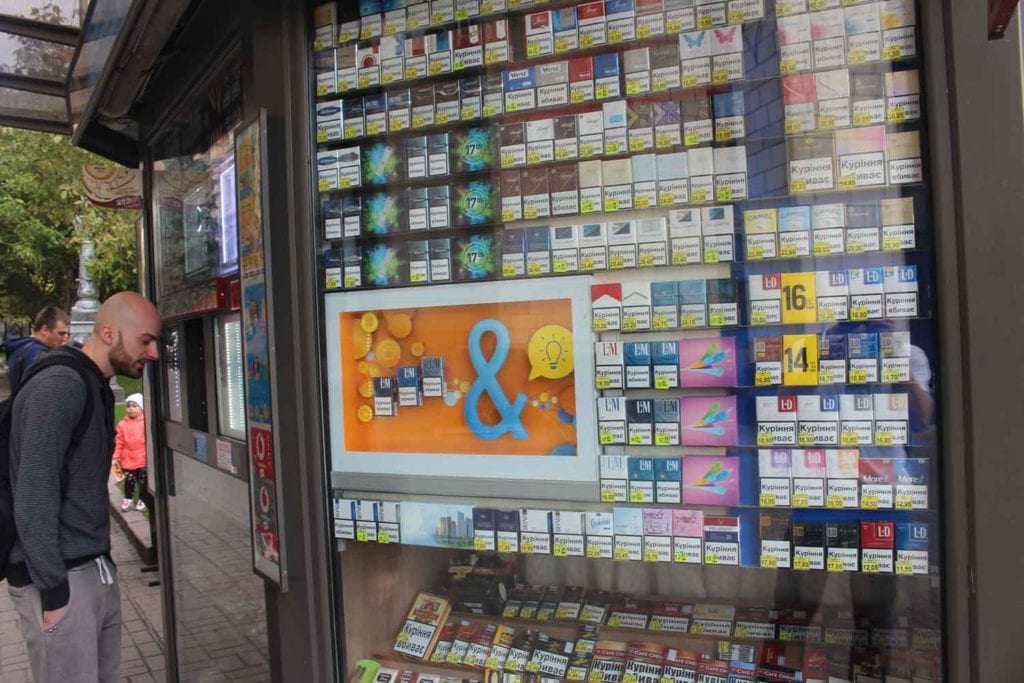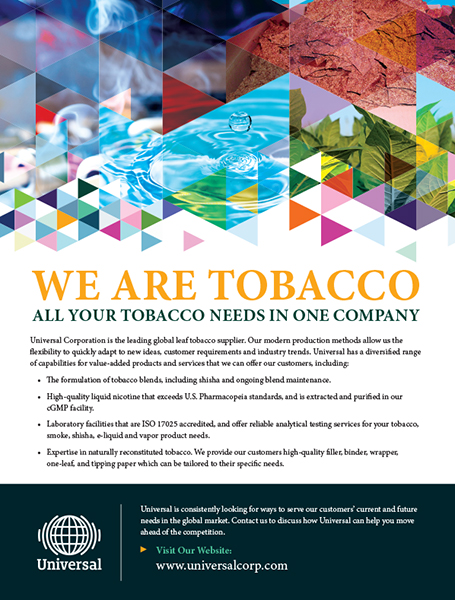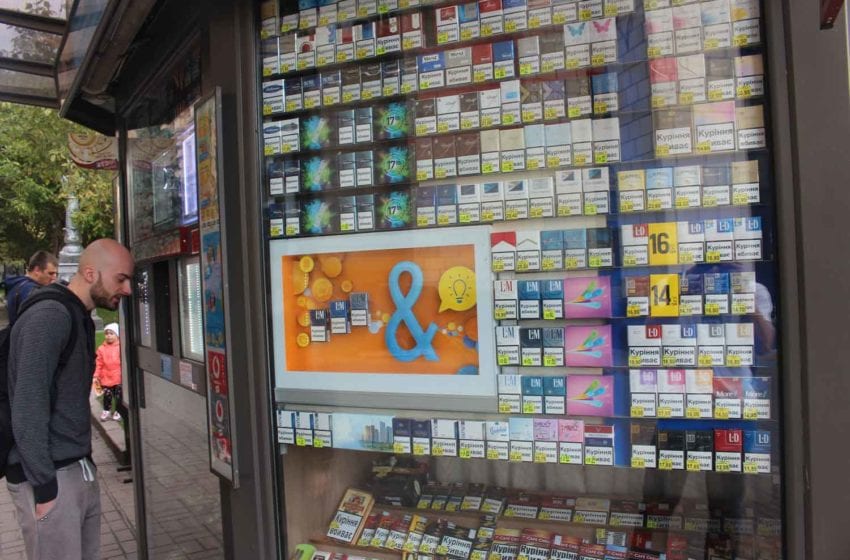
Ukraine’s anti-monopoly committee tries to break up a cartel it helped create.
By Stefanie Rossel
June 1, 2021, marked another step toward the end of a multimillion-dollar anti-competition lawsuit brought against four tobacco manufacturers and a distributor in Ukraine. On that day, the country’s Supreme Court ruled that a UAH460 million ($16.87 million) fine imposed by the Antimonopoly Committee of Ukraine (AMCU) against Imperial Tobacco Ukraine (ITU) and Imperial Tobacco Productions Ukraine for alleged violation of antitrust legislation was groundless.
The Supreme Court found that Imperial’s Ukrainian subsidiaries had not been involved in the events that had unlawfully left the country with only one cigarette distributor. In a press release, Imperial Tobacco Ukraine’s CEO, Ratislav Cernak, welcomed the decision, saying it was an encouraging sign for all foreign investors in Ukraine. The ruling followed the overturning of similar fines for British American Tobacco and Tedis in February and for Philip Morris International in April 2021. At the time of writing, Japan Tobacco’s case was still pending before the Supreme Court.
In October 2019, the AMCU imposed a record fine of UAH6.5 billion—one of the biggest in the country’s history—on the local affiliates of PMI, BAT and Imperial Brands, along with Tedis Ukraine, the country’s largest tobacco distributor, for conspiring to eliminate competition in cigarette distribution. The committee claimed that the tobacco companies and Tedis had conspired to keep new businesses from entering the market. The companies appealed but lost their cases in the first instance court. Both manufacturers and the American Chamber of Commerce (ACC) in Ukraine expressed concern about the anti-competition trial, arguing the defendants had not been given full access to the evidence on which the AMCU based its allegations and that insufficient attention was paid to the companies’ arguments during the trial.
The AMCU then asked the court to collect fines from all accused companies and freeze funds on their bank accounts, which could potentially have led to a manufacturing halt. In the face of such pressure, some of the companies paid up. However, some defendants also made clear their intention to defend their rights as foreign investors in arbitration.
On Dec. 21, 2020, PMI filed a lawsuit for bilateral investment arbitration at the International Center for Settlement of Investment Disputes in Washington, D.C., claiming their fine violated bilateral agreements on mutual protection of investments with the United States and Switzerland. Previously, the ACC had cautioned that such high-profile disputes, which involve consideration by international bodies and make Ukraine, not the AMCU, a party to the dispute, usually gain international publicity and could have a negative impact on Ukraine’s image among foreign investors. The organization had called for a quick, transparent and fair solution.

Self-Made Problem
The story behind the AMCU’s antimonopoly accusation is long and contradictory. Tedis and its predecessor company, Metropolis Ukraine, have repeatedly been the subject of legal challenges for antitrust behavior. Metropolis was founded in 2010 as a subsidiary of Megapolis, a Russian firm. At that time, it held 50 percent of the Ukrainian tobacco market, in which more than 50 cigarette distributors were operating. After a scandal that allegedly involved supplying weapons to the separatists in the war in Donbas in 2016, the company changed its name to Tedis Ukraine.
Gradually, the company took over most of its competitors, with the AMCU approving the acquisitions. As of 2020, Tedis ranked eighth in the Forbes’ “Top 100 largest private Ukrainian companies” rating, generating an annual turnover of UAH49.7 billion. In 2019, Tedis aimed to generate a turnover of UAH60 billion, the company’s CEO Taras Korniachenko said in an interview with liga.net. According to Wikipedia, the company is one of the country’s largest taxpayers, employing 2,500 people spread over 35 regional branches in 2020.
According to openforbusiness.com.ua, which quoted AMCU spokesperson Olha Pischanska, Tedis’ share of the Ukrainian market rose to 99 percent between 2013 and 2015 but decreased to less than 75 percent by 2019. She pointed out that in addition to Tedis, other companies were buying cigarettes from manufacturers.
Soon after Tedis had been cleared of the October 2019 charge, it was fined UAH274 million by the AMCU, which in March 2021 said that the company had not complied with an earlier ruling. In December 2016, the antitrust committee claimed that Tedis had abused its monopoly position between 2013 and 2015 and imposed a UAH431 million fine on the firm. The AMCU had also ordered the company to restore competition in the tobacco market. Tedis said it planned to appeal the most recent ruling, calling the decision “completely unfounded.” In an official statement on its website, it announced that it had fully paid the original fine in 2020 and fully fulfilled other obligations imposed by the AMCU.

Declining Legal Market
About one-third of Ukraine’s 45.4 million people smoke, according to worldpopulationreview.com. With a joint share of more than 90 percent, PMI, BAT, JTI and Imperial Brands dominate Ukraine’s tobacco market. They also rank among the country’s 10 largest taxpayers. In 2020, the country exported €227 million ($268 million) worth of cigars and cigarettes to the European Union.
Despite high domestic demand, cigarette sales in Ukraine have declined over the past few years. In 2019, the country produced 51 billion cigarettes, 15 percent less than in the previous year, a greater decrease than in the years 2011 to 2017 together, Imperial Brand’s country general manager said in an interview. His counterpart at PMI Ukraine expected a similarly steep drop for 2020.
Tax revenues from tobacco account for about eight percent of Ukraine’s total state budget. In the past years, the country has repeatedly raised the excise duty for cigarettes, most recently by 20 percent in January. Presently, the specific rate of excise duty is UAH1,088.64 per 1,000 cigarettes, and the minimum rate is UAH1,456.33 per 1,000 cigarettes. Taxation accounts for around 70 percent of the pack price in Ukraine.
The former Soviet republic is one of the poorest countries in Europe, with an average nominal salary of €300 ($354) in 2019. Amid rising prices of legal smokes, the illegal cigarette market in Ukraine has flourished: According to PMI Ukraine’s CEO, the share of illegal cigarettes—including smuggling, counterfeiting and cigarettes with counterfeit excise stamps—has grown from 1 percent in 2016 to 9 percent in 2020.
Ukraine is also the No. 1 country of origin for illicit cigarettes trafficked into the EU. In 2018 alone, inflows from Ukraine accounted for more than 4 billion cigarettes, according to the European Commission. Until recently, smuggling tobacco to other countries was not illegal in Ukraine. In April 2021, after years of pressure from the EU, Ukrainian President Volodymyr Zelensky introduced a bill that would make trafficking a crime punishable by up to 12 years in prison and a significant fine.
Important Matter
Solving the tobacco cartel dispute is essential for Ukraine as this is part of the Association Agreement between with EU that entered into force in September 2017. The contract establishes a comprehensive free-trade area between the parties and commits Ukraine to economic, judicial and financial reforms to converge its policies and legislation to those of the EU. Among other things, it requires the parties to “recognize the importance of free and undistorted competition in their trade relations.” The EU is Ukraine’s largest trading partner, accounting for more than 40 percent of its trade in 2019. Ukraine is preparing to formally apply for EU membership in 2024.
To break up the monopoly, the country’s cabinet published a resolution in September 2020, which foresees the establishment of a national operator in the tobacco market by the end of 2021. Starting out as a pilot project, the operator’s task will be to combat tax evasion, smuggling and counterfeiting by introducing a track-and-trace system. The move is supposed to attract investment and is expected to add more than $535 million to the state budget.
Critics, however, fear it would cement Tedis’ leading role and boost the illicit tobacco market. Legal challenges to the plan have been filed already. Ukraine’s road to EU membership is likely to be a long one.


